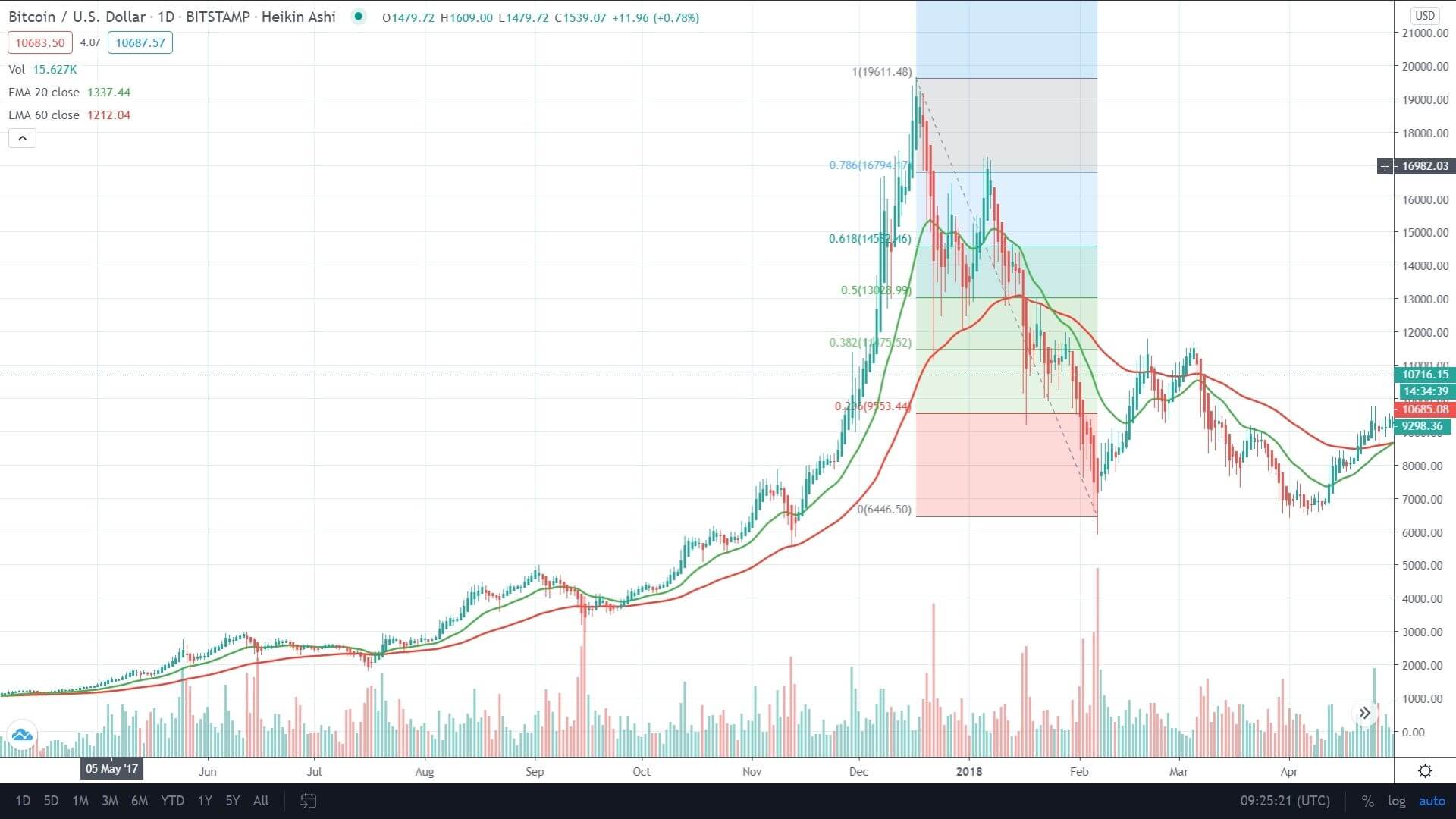Will lawyers be relevant for the DeFi revolution?
Software code review might play a vital role in regulating the financial sector of the future.
(yes, you read that well, and I elaborate on my thoughts below)
The world of cryptocurrency has gone through a few "booms and busts" in its short history since bitcoin's inception.
The last "bubble" that popped in early 2018 was produced mostly by the greed for fast returns expected out of so-called initial cryptocurrency offerings (ICOs). The sell-off that lasted mainly from January to February 2018 (bitcoin's price fell 65 percent) was widely publicized. It even managed to get its own Wikipedia short article titled "Cryptocurrency bubble."
Editor's note: Ouch
Since then, a part of investors exited the crypto world; startups closed their doors, enforcement actions from various regulators took place globally, and...
We've seen lots of progress in crypto use-cases. Notably, bitcoin and some other major cryptocurrencies got more connected to the traditional financial system than ever before.
A lot has been happening in the crypto industry lately. Moreover, some trends recently emerged at the forefront of the industry in terms of their potential.
Without considering higher regulatory clarity and a wider acceptance of some major cryptocurrencies, we can say that there is at least one general trend that emerged in the last few months in the crypto space: decentralized finance (or DeFi in short).
Highly controversial and still pretty nascent, decentralized finance, at least for now, seems to represent a financial ecosystem of decentralized applications (DApps) built on one of the blockchain networks that support such applications. Currently, the Ethereum appears to be in the lead.
DeFi as a competing force and its risks
Decentralized finance (DeFi) represents the decentralized apps (apps that run on a distributed computing system, on the blockchain) that leverage decentralized networks to transform old financial products into trustless and open protocols that run without intermediaries.
Since the system on which such dapps lay upon are usually open-source, anyone with an internet connection can start building decentralized finance applications and products. And precisely this feature will be (or maybe already is) causing some issues with the regulators.
“Imagine anyone being able to launch a bank, sell and purchase any derivative available, or create any possible quasi-financial product. A cause for panic among the bankers? Perhaps…” - Žiga Perović
It is not my intention to speculate whether unchecked freedom to create financial products and services would advance the users' economic well-being. That feels like a (mostly) political question that I'd prefer not to take here. Nonetheless, DeFi might be a trend that might show us a tiny bit of the future of financial technology.
A lot has been said and done about different benefits and risks related to DeFi products lately. The micro-level upside is evident to many - from saving, lending, borrowing, to even investing, all while using a simple cryptocurrency wallet.
However, the risks are sometimes not so obvious. They could range from smart contract exploits and errors (you need a software engineering background to spot those) to human errors (e.g., losing your wallet key that no one can help you recover).
On the other hand, the macro or global level may be a more bit more interesting in case DeFi truly starts competing with traditional financial products and services. Would that lead to destabilization of the financial world? Would some national currencies become irrelevant? Nobody can tell at this point.
What about lawyers and DeFi?
In addition to economic aspects, interesting yet often overlooked questions that arise are mostly regulatory related. And what goes hand in hand with laws and regulations? Lawyers, of course.
Software engineers seem to be slowly turning the financial technology and regulatory supervision on its head. After all, they are laying down the foundation for virtually any quasi-financial product to be available online to anyone. Hence, we can quickly reach the question: what role could lawyers possibly play if DeFi truly takes off?
What if the large part of providing basic (legal) structure to financial products moves from the hands of lawyers writing legal provisions and contracts to software engineers writing code and smart contracts?
Without opening the discussion about how the regulators will eventually approach the oversight and enforcement concerning DeFi, the above two questions are intellectually engaging. Suppose we assume DeFi takes off in the future (i.e., many software developers launch their proprietary financial products and services). In that case, the lawyers would likely feel the effects on their own skin as their roles and responsibilities will probably start to change quite fast.
DeFi raises a lot of legal challenges and concerns. The role lawyers could play in the future is undoubtedly one of the questions we will have to answer in practice. For now, I will try to tackle it below theoretically.
What if…
...we imagine that the development of a more open financial system (which DeFi has the potential to become) may follow the path the development and regulation of the internet took? You know, in the 90s?
At first, no one really thought about special rules for protecting our data or our rights as consumers on the world wide web. These rules gradually entered into life worldwide.
Nowadays, you are still free to set your website, but you have to follow some rules once you start selling services or products online. At the very least, consumer regulations and data protection come to mind.
DeFi could likely take a similar path. If it does, anyone could be able to launch a smart contract that facilitates lending and borrowing of crypto assets. They would, of course, have to comply with relevant rules.
Even if some of the software developers and founders of decentralized protocols think that regulations cannot reach them, they might be in for a surprise. Financial regulation might gradually move from approving a product or service before it even sees the light of day to reviewing available solutions and warning consumers about the pitfalls.
Code review might play a significant role in regulating the financial sector of the future.
The regulators might have a challenging task of keeping the plethora of financial services available on different chains at bay. But what will the lawyers (that now help fintech businesses and its founders) do in the future?
Lawyers that nowadays deal with DeFi related legal issues might shift their direction. In my view, there are at least three critical DeFi trends that are relevant for lawyers in that sector:
DeFi's open-source spill-over effect
Lawyers will have to closely collaborate with software developers when designing DeFi products and services. Not only because of the regulation but also because of governance issues.
Products, services, and companies of the future could be able to deviate from the regulatory provided options. It will be of great importance for the businesses to get all of the included structures right from the get-go. If open-source blockchain networks win (which I hope they do), the open-source movement (mostly confined to software development) will spill over to other areas, including the legal sector.
Imagine seeing the corporate and regulatory structure of a company on the chain. It might just be possible in the future.
Smart contract review and contract review convergence
Some people still feel that everyone should learn to code. Software languages are essential. They are the foundation of many services and products we might use daily, yet take for granted.
Even if lawyers could still render services without knowing any code, we might see the legal and the software development worlds coming closer. For example, reviewing contracts could resemble smart contract reviews (or code reviews in general).
"Imagine cases where regulators would have to dive into smart contracts to check if a DeFi product or service complies with legal standards. We, lawyers, might have to know a bit more about reading code than (most of us) do today…" - Žiga Perović
Built-in regulation as the new normal
As mentioned, the regulators could require the specific safeguards within DeFi products to have them compliant and approved. These might come packaged within plugins or frameworks that, again, would have to be scrutinized by lawyers and engineers alike.
In addition to publishing decisions, guidelines, and recommendations, as they nowadays do, the authorities might start to whitelist blockchain networks and software solutions that would have to be incorporated within such futuristic products.
Software engineers seem to be on a path to create blockchain-based financial instruments that could rival modern financial instruments within the categories of borrowing, lending, and even futures trading. This development might change the work we, lawyers, do as well.
Even if the future turns out quite differently, I feel crypto assets will play an important role.
Traditionally, the financial sector is among the most regulated, as it involves many risks with potentially severe consequences. We, lawyers, must help create sustainable and fair products and services that will form the financial system of the future.
This process will slowly change our responsibilities and daily tasks, that's for sure. However, it will never take away the essence. We will still need to assess and stay on top of the legal risks. Now, whether this scrutiny takes the form of code reviews or reading through written sentences - that's another story altogether.
Ivan Rasic holds the Transnational Trade Law and Finance LLM, a program by Universidad de Deusto (Bilbao, ES), Universiteit van Tilburg (Tilburg, NL), and Goethe Universität (Frankfurt, DE). After his work in law firms and inhouse, he started a legal tech company.
Nowadays, Ivan leads STP Informationstechnologie GmbH's Sofia RnD center with project/development management, culture, strategy, and special project initiatives.
Ivan is an Ambassador at European Legal Tech Association (ELTA). He closely follows and writes on future of law, legal tech, ALSPs, and new ways of delivering legal services.
Žiga Perović is a legal professional and anti-money laundering specialist, working for Bitstamp - the prominent international crypto exchange. As a fintech and legaltech enthusiast, he is a part of the regional and global communities in these fields.
Žiga runs two local, Slovenia-based chapters of international communities: NewFinance FinTech Meetup and Legal Hackers. He closely follows the development of regulation related to virtual assets, financial and legal innovation.



